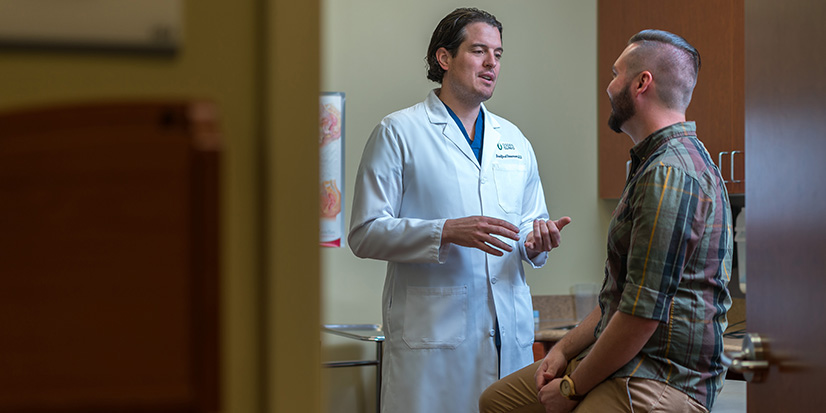Aside from the obvious differences in reproductive health, there are many health conditions that affect men differently. Men may experience unique symptoms for the same medical problem and they’re sometimes at a higher risk of developing health conditions. Biological factors like hormones, sex chromosomes, reproductive anatomy, and metabolism all contribute to these differences. Social and behavioral factors can play a role, too.
Here are five conditions in which men present unique or differing symptoms.
Heart Disease
Heart disease is the number one killer of both men and women in the United States, but men tend to run a high risk at an earlier age. On average, women develop heart disease a decade later than men due to the proactive effects of estrogen. And although men tend to develop heart disease earlier in life, women have a higher mortality rate.
On average, men develop heart disease a decade earlier than women.
Men are more likely than women to suffer a heart attack before age 55. But once women go through menopause and their hormones shift, their risk of heart disease increases. In addition, women are more susceptible to high blood pressure post-menopause. Knowing the risk factors of heart disease regardless of your gender can save your life.
Sleep Apnea
Sleep apnea is typically thought of as a disorder that affects men, not women. But according to the National Sleep Foundation, obstructive sleep apnea (OSA) affects both genders but the ratio of men vs. women diagnosed with OSA is about 8 to 1.
Men report sleep apnea symptoms like snoring, waking up gasping for air or snorting. Women tend to report the symptoms like fatigue, anxiety, or depression.
What’s interesting about sleep apnea is how different the symptoms can vary by gender. While men often report snoring, waking up gasping for air, or snorting, many women report symptoms like fatigue, anxiety, and depression. The effects of sleep apnea can take a toll on your life regardless of your gender, so consider scheduling a sleep study if you suspect that you’re not sleeping adequately.
Hair Loss
Men tend to experience the “obvious” signs of hair loss more often than women because patterns of baldness affect them differently.
Both genders experience hair loss, but male-pattern hair loss usually begins earlier in life and at the front and vertex of a man’s scalp.
Estrogen is a protective factor for women, who often don’t experience hair loss until after age 30. Female-pattern baldness is a more diffused and subtle hair loss that preserves the frontal hairline. Over-the-counter and prescription treatments are available for both genders to restore hair loss.
Kidney Stones
Diseases like bladder inflammation (interstitial cystitis) are much more common in women, while men are twice as likely to develop kidney stones.
1 in 8 men will develop a kidney stone during his lifetime.
Kidney stones are painful and treatment depends on the stone’s size and location. Why do men have the short end of the stick? Some experts suggest that diet plays a big role. Men tend to have a greater intake of protein and salt, two risk factors for developing the masses. Some other risk factors include dehydration, obesity, and a family history of kidney stones. The good news is that with proper hydration, maintaining a healthy weight, and other dietary changes, kidney stones can be prevented in men.
Alcohol Abuse
Men and women are not created equal when it comes to the effects of alcohol. According to the Centers for Disease Control and Prevention (CDC), men face higher rates of alcohol-related deaths and hospitalizations than women do. Men also binge drink twice as much as women and are prone to develop aggression.
Men are twice as likely to be binge drinkers and face more alcohol-related deaths and injuries.
Alcohol consumption is linked to cancer of the mouth, throat, esophagus, liver, and colon cancers. Alcohol also interferes with testicular and hormone production and may play a role in depression cases and suicide deaths among men.
Closing the Gap
The stereotype is true (and unfortunate): Men are much too casual about their own health. In a survey conducted by Cleveland Clinic in 2016, more than 500 men ages 18-70 were asked about proactive healthcare. About 40% reported that they only go to the doctor when they fear they have a serious medical condition. We can do better, and here’s how.

See your provider and get your screens: Regular check-ups can detect a number of diseases that can threaten a man’s life. Don’t be like the 40% of men above and wait until a problem becomes unbearable. Have issues looked at early by your physician and get your recommended screens.
Tell the truth: It’s uncomfortable for men to discuss health issues (particularly related to urology and/or sexual health). Not talking about it won’t make it go away—but it could make problems worse. Don’t shy away from asking your doctor sensitive health questions.
Monitor health concerns: Be self-aware of any health or body changes you experience. New mole? Nagging back pain? Feeling defeated or depressed? All of these conditions should be monitored closely and discussed with your primary care provider—especially if symptoms are becoming worse.




.4).2511050842400.png)
.jpg.2511241144379.webp)